The demand for fruit snacks in Japan is expected to grow from USD 337.5 million in 2025 to USD 579.2 million by 2035, reflecting a CAGR of 5.6%. The increasing demand for healthy snack alternatives, particularly among consumers seeking natural ingredients, is driving the growth of the fruit snack market. With rising awareness about the benefits of fruit-based snacks over traditional processed options, the market is seeing growing interest in dried fruit, fruit bars, and other fruit-based snack formats. The convenience of these snacks, along with their nutritional benefits, positions them well in the on-the-go lifestyle, contributing to their rise in popularity across various age groups.
Japan’s health-conscious consumer base, combined with an increasing preference for clean-label and organic products, is also playing a key role in the market's growth. The expansion of distribution channels, including supermarkets, convenience stores, and online platforms, is further enhancing accessibility and driving consumption. Additionally, the growing focus on functional foods that provide not just taste but also health benefits is leading to innovations in the fruit snack segment, further propelling demand.
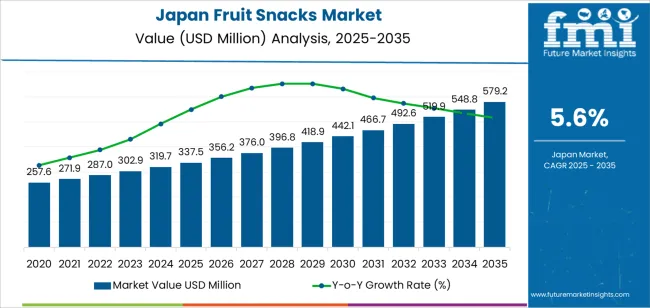
From 2025 to 2030, the demand for fruit snacks in Japan will grow from USD 337.5 million to USD 442.1 million, contributing USD 104.6 million in value. This phase will see steady growth and is expected to experience a moderate acceleration in demand. Consumer preference for healthier snacks, coupled with increased awareness of the nutritional benefits of fruit snacks, will be the primary drivers of this growth. As the market becomes more established, growth stabilization occurs, with consumer adoption reaching wider groups seeking nutritious options. The peak-to-trough analysis shows a consistent increase, but at a slower acceleration toward the latter part of this phase due to market maturity.
From 2030 to 2035, the market will grow from USD 442.1 million to USD 579.2 million, adding USD 137.1 million in value. While the market will continue to expand, the growth rate will decelerate slightly. This phase will be marked by market maturity, with the product category becoming more widely adopted. However, demand will continue to rise due to product innovations, an increasing number of health-conscious consumers, and the growing preference for clean-label, organic snacks. The trough-to-peak pattern indicates a steady, yet moderated growth, as the market reaches a more saturated phase where the focus shifts to innovation and differentiation in offerings rather than explosive growth.
| Metric | Value |
|---|---|
| Industry Sales Value (2025) | USD 337.5 million |
| Industry Forecast Value (2035) | USD 579.2 million |
| Industry Forecast CAGR (2025 to 2035) | 5.6% |
Demand for fruit snacks in Japan is rising as consumers increasingly seek healthy, convenient and portable snacking options. The Japanese fruit snacks market was valued at approximately USD 489.2 million in 2022 and is forecast to reach around USD 860.3 million by 2030. The growing interest stems from increased health awareness, urban lifestyles and a preference for snack formats that offer fruit based nutrition rather than traditional confectionery.
Another factor contributing to growth is the expansion of snack innovation and distribution channels. Manufacturers are introducing premium fruit snack formats, including freeze dried fruit slices, fruit bars and novel flavour combinations derived from domestic fruit varieties. Convenience stores and online retail are key distribution points, offering quick access to a wide selection of fruit based snacks. Challenges include the declining population and increased competition from savory snack categories, which may limit volume growth. Nonetheless, given the alignment with wellness trends, product innovation and convenience driven consumption, demand for fruit snacks in Japan is expected to grow steadily.
The demand for fruit snacks in Japan is primarily driven by product type and product claim. The leading product type is dried fruits, capturing 34% of the market share, while organic is the dominant product claim, accounting for 34.2% of the demand. Fruit snacks, including dried fruits, fruit chips, and fruit-based snack bars, have become increasingly popular due to their health benefits, convenience, and natural ingredients. The growing demand for healthy, snackable options among Japanese consumers is fueling the rise of these products in the market.
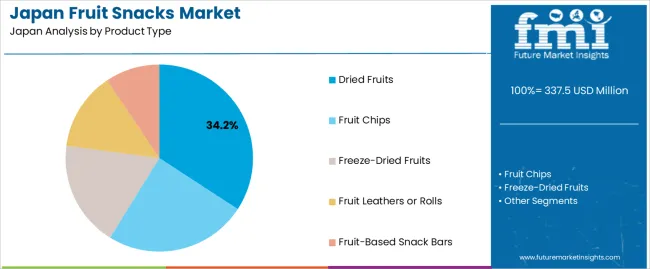
Dried fruits lead the fruit snacks market in Japan, accounting for 34% of the demand. Dried fruits, such as raisins, apricots, and mangoes, are a popular and healthy snacking option. These snacks are packed with nutrients and offer a natural, convenient way to enjoy fruit without the need for refrigeration or preparation. Their long shelf life and portability make them especially popular for on-the-go consumers, from children to adults.
The demand for dried fruits is driven by their versatility, nutritional value, and appeal to health-conscious consumers who seek snacks that are both nutritious and satisfying. Additionally, the popularity of dried fruits is bolstered by the increasing preference for natural and minimally processed snacks. As consumers in Japan continue to prioritize healthier eating habits, the demand for dried fruits as a fruit snack is expected to remain strong.
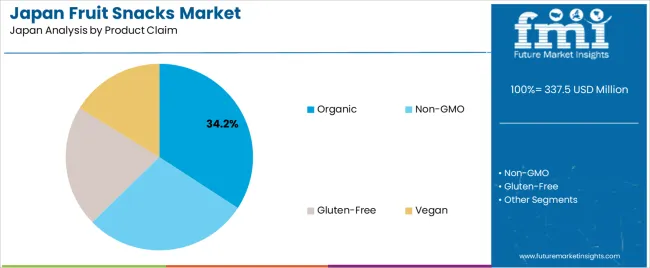
Organic is the leading product claim for fruit snacks in Japan, accounting for 34.2% of the demand. Organic fruit snacks are preferred by consumers who are seeking clean, environmentally friendly, and healthier alternatives to conventional snacks. Organic fruit snacks are made from fruits that are grown without synthetic pesticides or fertilizers, and they align with the growing interest in sustainable and natural food products.
The demand for organic fruit snacks is driven by the increasing awareness of the benefits of organic food and the desire to avoid chemicals in everyday diets. Consumers in Japan are becoming more health-conscious and are willing to pay a premium for organic products, especially when it comes to snacks for children or as part of a balanced lifestyle. As the trend toward organic products continues to rise, organic fruit snacks will likely remain a dominant choice in the market.
Demand for fruit snacks in Japan is increasingly shaped by a health conscious consumer base, rapid convenience oriented eating habits and strong interest in functional food formats that blend flavor and wellness. Japanese snack buyers are drawn to products derived from real fruit, offering vitamin rich, low calorie and natural ingredient profiles. At the same time, mature retail penetration, intense competition and taste expectations in the domestic market set a high bar for innovation and quality. These forces collectively steer the growth trajectory of the fruit snack category in Japan.
Several growth drivers are prominent in the Japanese market. First, rising consumer awareness of healthy eating, weight management and digestive health encourages snacks that contain fruit, fiber and reduced sugar. Second, growth in on the go consumption and busy lifestyles supports portable snack formats such as fruit bars, freeze dried fruit slices and gummies. Third, demographic factors-such as an ageing population seeking immune support or younger consumers gravitating to trend driven snacks-create multiple target segments. Fourth, channel expansion into convenience stores (konbini), online retail and ready meal tie ins enhances availability and convenience for fruit snack purchase.
Despite favourable market conditions, certain restraints temper growth. One restraint is strong consumer preference for fresh fruit, which competes with processed fruit snack formats and may limit substitution. Another constraint is cost pressure, as premium fruit snack ingredients, organic certification and functional enhancements can drive higher retail prices. Also, Japan’s snack category is highly mature and reward for incremental innovation may be diminishing, limiting large leap expansions. Finally, regulatory scrutiny and consumer demands for clean labels and low sugar may challenge manufacturers' ability to scale quickly.
Notable trends in Japan’s fruit snack sector include the rise of fortified and functional fruit snack products-such as probiotic fruit gummies, collagen infused fruit bars and freeze dried fruits aimed at health outcomes. Another trend is flavour innovation and premiumisation, with domestic brands using locally sourced fruits (such as Shine Muscat grapes or yuzu) to create distinct offerings. The online channel and convenience store networks are increasingly important, with limited edition and seasonal snack releases driving enthusiasm among younger consumers. Moreover, packaging innovation and clean label ingredients are aligning with Japanese consumer expectations for transparency and quality in snack products.
The demand for fruit snacks in Japan is driven by the increasing consumer preference for healthier, convenient snack options. As consumers become more health-conscious, the demand for natural, low-calorie, and nutrient-dense snacks like fruit-based products continues to grow. Fruit snacks, which are often perceived as a healthier alternative to traditional junk food, cater to busy lifestyles by offering a quick, on-the-go option that provides essential vitamins and fiber. The growing trend toward natural and organic foods, coupled with rising awareness of the benefits of fruit consumption, has further fueled this demand.
Additionally, the increasing popularity of functional foods that support immune health and digestive well-being is contributing to the rise of fruit snacks in the Japanese market. Regional variations in demand are influenced by factors such as population size, local taste preferences, and the availability of fruit snack products. Below is an analysis of the demand for fruit snacks across different regions in Japan.
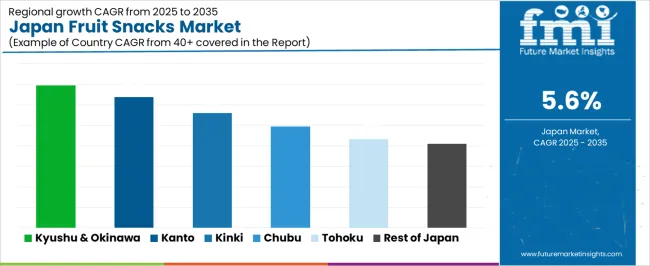
| Region | CAGR (2025-2035) |
|---|---|
| Kyushu & Okinawa | 6.9% |
| Kanto | 6.4% |
| Kinki | 5.6% |
| Chubu | 4.9% |
| Tohoku | 4.3% |
| Rest of Japan | 4.1% |
Kyushu & Okinawa leads the demand for fruit snacks in Japan with a CAGR of 6.9%. This can be attributed to the region's focus on health and wellness, particularly in Okinawa, which is famous for its healthy lifestyle and long life expectancy. The increasing preference for natural, nutrient-dense snacks among the population, combined with a strong culture of healthy eating, has contributed to the rise in demand for fruit snacks in the region.
Kyushu & Okinawa's agricultural base, which produces a variety of fruits, also supports the growth of local fruit snack products. The region's commitment to sustainability and natural food sources, along with the rising popularity of functional foods, further contributes to the strong market growth for fruit snacks. As the region’s population continues to focus on maintaining a healthy diet, the demand for fruit snacks is expected to remain high.
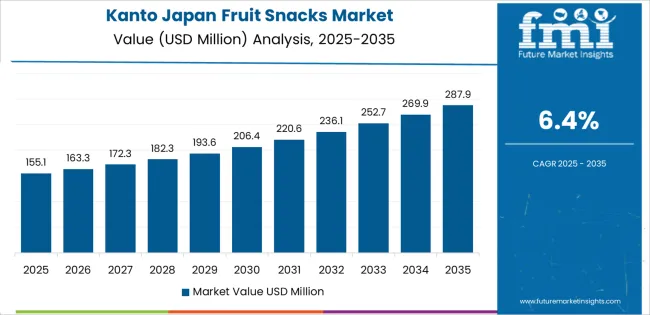
Kanto shows strong demand for fruit snacks with a CAGR of 6.4%. As Japan’s economic and cultural hub, Kanto, which includes Tokyo and its surrounding areas, has a large, diverse consumer base that is increasingly seeking healthy snack alternatives. Busy professionals, health-conscious consumers, and urban dwellers in Kanto are driving the growing demand for convenient, on-the-go snacks like fruit-based products.
The region’s high level of disposable income, along with the presence of numerous health food stores and supermarkets, supports the widespread availability and consumption of fruit snacks. Kanto's growing interest in health trends, such as plant-based diets and clean-label products, further fuels the demand for nutritious and natural snack options. As the region’s consumer preferences shift toward healthier products, the demand for fruit snacks continues to rise steadily.
Kinki, with a CAGR of 5.6%, shows steady demand for fruit snacks. The region includes major cities like Osaka, Kyoto, and Kobe, where there is a strong focus on food culture and a growing interest in health and wellness. Kinki’s demand for fruit snacks is driven by the region’s busy urban population, which is increasingly seeking healthy and convenient snack options.
Although the growth rate is slightly slower than in Kyushu & Okinawa and Kanto, the steady demand for fruit snacks in Kinki is supported by the region's strong food industry and consumer interest in functional foods. The availability of fruit snacks in local supermarkets, convenience stores, and health food stores continues to meet the needs of health-conscious consumers, ensuring consistent growth in the market.
Chubu demonstrates moderate growth in the demand for fruit snacks with a CAGR of 4.9%. The region, which includes Nagoya and surrounding areas, has a growing food and beverage industry that increasingly focuses on healthier, natural snack options. The demand for fruit snacks in Chubu is supported by the region's rising interest in functional and plant-based foods, as well as the growing popularity of snacks that provide essential nutrients and support overall well-being.
While the demand growth is not as strong as in Kyushu & Okinawa and Kanto, Chubu’s steady focus on health and wellness, coupled with the increasing awareness of the benefits of fruit consumption, is driving moderate growth in the fruit snacks market. As consumer preferences in the region shift toward healthier options, the demand for fruit snacks is expected to grow steadily.
Tohoku, with a CAGR of 4.3%, and the Rest of Japan, with a CAGR of 4.1%, show slower growth in the demand for fruit snacks compared to more urbanized regions. These areas are more rural, and consumer preferences may be slower to shift toward healthier, convenient snack options. However, the growing awareness of the health benefits of fruits and natural snacks is driving incremental demand in these regions.
While the demand is slower, the increasing availability of fruit snacks in supermarkets and convenience stores in Tohoku and other rural areas is contributing to steady market growth. As more consumers in these regions adopt healthier eating habits and seek convenient, on-the-go options, the demand for fruit snacks is expected to grow at a moderate pace.
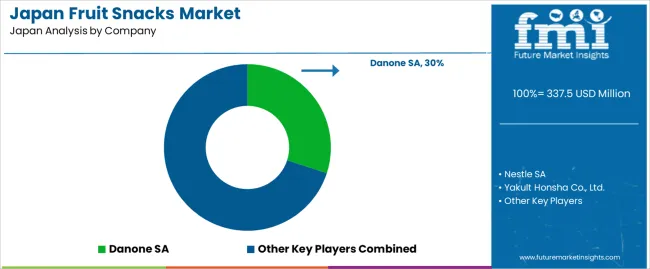
The demand for fruit snacks in Japan is increasing as consumers increasingly seek healthier, convenient snack options that align with their busy lifestyles and growing health consciousness. Companies like Danone SA (holding approximately 30% market share), Nestlé SA, Yakult Honsha Co., Ltd., ADM, and Kerry Group are key players in this market. Fruit snacks, including dried fruit, fruit bars, and fruit-based gummies, are gaining popularity due to their nutritional benefits, portability, and natural ingredient appeal.
Competition in the fruit snacks industry is primarily driven by product innovation, taste, and health benefits. Companies are focusing on offering fruit snacks that are not only delicious but also nutritious, with many products featuring added fiber, vitamins, and minerals. Another area of competition is the use of natural, clean-label ingredients, as Japanese consumers increasingly favor snacks with minimal processing and no artificial additives. Packaging and convenience are also important, with companies developing easy-to-carry, single-serve packs that appeal to busy consumers. Additionally, companies are exploring flavors and combinations that cater to local tastes, such as incorporating traditional Japanese fruits and ingredients. Marketing materials often highlight health benefits, product quality, and convenience. By aligning their products with the growing demand for healthy, natural, and convenient snack options, these companies aim to strengthen their position in Japan’s competitive fruit snacks market.
| Items | Details |
|---|---|
| Quantitative Units | USD Million |
| Regions Covered | Japan |
| Product Type | Dried Fruits, Fruit Chips, Freeze-Dried Fruits, Fruit Leathers or Rolls, Fruit-Based Snack Bars |
| Product Claim | Organic, Non-GMO, Gluten-Free, Vegan |
| End Use Application | Retail/Household Consumption, Foodservice/HoReCa, Industrial Use |
| Sales Channel | Store-based Retail, Online Retail |
| Packaging Type | Single-Serve Packs, Multi-Serve Packs, Bulk Packaging, Resealable Pouches, Cups and Trays |
| Key Companies Profiled | Danone SA, Nestle SA, Yakult Honsha Co., Ltd., ADM, Kerry Group |
| Additional Attributes | The market analysis includes dollar sales by product type, product claim, end-use application, sales channel, and packaging type categories. It also covers regional demand trends in Japan, particularly driven by the growing demand for healthy, convenient fruit snacks across different consumer segments. The competitive landscape highlights key manufacturers focusing on innovations in organic, non-GMO, and gluten-free snacks. Trends in the increasing adoption of online retail and eco-friendly packaging are explored, along with advancements in product formulation and sustainability initiatives. |
The demand for fruit snacks in Japan is estimated to be valued at USD 337.5 million in 2025.
The market size for the fruit snacks in Japan is projected to reach USD 579.2 million by 2035.
The demand for fruit snacks in Japan is expected to grow at a 5.6% CAGR between 2025 and 2035.
The key product types in fruit snacks in Japan are dried fruits, fruit chips, freeze-dried fruits, fruit leathers or rolls and fruit-based snack bars.
In terms of product claim, organic segment is expected to command 34.2% share in the fruit snacks in Japan in 2025.






Our Research Products

The "Full Research Suite" delivers actionable market intel, deep dives on markets or technologies, so clients act faster, cut risk, and unlock growth.

The Leaderboard benchmarks and ranks top vendors, classifying them as Established Leaders, Leading Challengers, or Disruptors & Challengers.

Locates where complements amplify value and substitutes erode it, forecasting net impact by horizon

We deliver granular, decision-grade intel: market sizing, 5-year forecasts, pricing, adoption, usage, revenue, and operational KPIs—plus competitor tracking, regulation, and value chains—across 60 countries broadly.

Spot the shifts before they hit your P&L. We track inflection points, adoption curves, pricing moves, and ecosystem plays to show where demand is heading, why it is changing, and what to do next across high-growth markets and disruptive tech

Real-time reads of user behavior. We track shifting priorities, perceptions of today’s and next-gen services, and provider experience, then pace how fast tech moves from trial to adoption, blending buyer, consumer, and channel inputs with social signals (#WhySwitch, #UX).

Partner with our analyst team to build a custom report designed around your business priorities. From analysing market trends to assessing competitors or crafting bespoke datasets, we tailor insights to your needs.
Supplier Intelligence
Discovery & Profiling
Capacity & Footprint
Performance & Risk
Compliance & Governance
Commercial Readiness
Who Supplies Whom
Scorecards & Shortlists
Playbooks & Docs
Category Intelligence
Definition & Scope
Demand & Use Cases
Cost Drivers
Market Structure
Supply Chain Map
Trade & Policy
Operating Norms
Deliverables
Buyer Intelligence
Account Basics
Spend & Scope
Procurement Model
Vendor Requirements
Terms & Policies
Entry Strategy
Pain Points & Triggers
Outputs
Pricing Analysis
Benchmarks
Trends
Should-Cost
Indexation
Landed Cost
Commercial Terms
Deliverables
Brand Analysis
Positioning & Value Prop
Share & Presence
Customer Evidence
Go-to-Market
Digital & Reputation
Compliance & Trust
KPIs & Gaps
Outputs
Full Research Suite comprises of:
Market outlook & trends analysis
Interviews & case studies
Strategic recommendations
Vendor profiles & capabilities analysis
5-year forecasts
8 regions and 60+ country-level data splits
Market segment data splits
12 months of continuous data updates
DELIVERED AS:
PDF EXCEL ONLINE
Demand Signal Repository Solutions Market Size and Share Forecast Outlook 2025 to 2035
Demand Side Management Market Size and Share Forecast Outlook 2025 to 2035
Demand Response Market Analysis - Size, Share, and Forecast Outlook 2025 to 2035
North America Shipping Supplies Market Trends – Innovations & Growth 2024-2034
Demand of Kozani Saffron in Greece Analysis - Size, Share & Forecast 2025 to 2035
Demand of No-acid Whey Strained Dairy Processing Concepts in European Union Size and Share Forecast Outlook 2025 to 2035
Demand for Bronte Pistachio in Italy Analysis - Size, Share & Forecast 2025 to 2035
Demand and Trend Analysis of Gaming Monitor in Western Europe Size and Share Forecast Outlook 2025 to 2035
Demand and Trend Analysis of Gaming Monitor in Korea Size and Share Forecast Outlook 2025 to 2035
Demand and Trend Analysis of Gaming Monitor in Japan Size and Share Forecast Outlook 2025 to 2035
Glycine Soja (Soybean) Seed Extract Market Size and Share Forecast Outlook 2025 to 2035
Demand and Trend Analysis of Yeast in Japan - Size, Share, and Forecast Outlook 2025 to 2035
Demand of Pistachio-based desserts & ingredients in France Analysis - Size, Share & Forecast 2025 to 2035
Western Europe Men’s Skincare Market Analysis – Forecast 2023-2033
Demand and Trends Analysis of Stevia in Japan Size and Share Forecast Outlook 2025 to 2035
Japan Women’s Intimate Care Market Trends – Growth & Forecast 2024-2034
Demand and Trend Analysis of Fabric Stain Remover in Korea Size and Share Forecast Outlook 2025 to 2035
Demand and Sales Analysis of Paper Cup in Korea Size and Share Forecast Outlook 2025 to 2035
Demand and Sales Analysis of Paper Cup in Western Europe Size and Share Forecast Outlook 2025 to 2035
Demand of MFGM-enriched Powders & RTDs in European Union Size and Share Forecast Outlook 2025 to 2035

Thank you!
You will receive an email from our Business Development Manager. Please be sure to check your SPAM/JUNK folder too.
Chat With
MaRIA